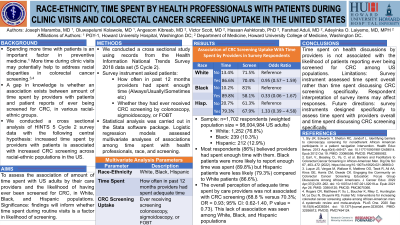Sunday Poster Session
Category: Colorectal Cancer Prevention
P0394 - Race-Ethnicity, Time Spent by Health Professionals With Patients During Routine Clinical Visits and Colorectal Cancer Screening Uptake in the United States
Sunday, October 27, 2024
3:30 PM - 7:00 PM ET
Location: Exhibit Hall E

Has Audio

Joseph Maramba, MD
Howard University
Washington, DC
Presenting Author(s)
Joseph Maramba, MD1, Oluwapelumi Kolawole, MD1, Angesom Kibreab, MD2, Victor Scott, MD1, Hassan Ashktorab, PhD1, Hassan Brim, PhD1, Zaki Sherif, MD, PhD1, Farshad Aduli, MD2, Adeyinka O. Laiyemo, MD, MPH2
1Howard University, Washington, DC; 2Howard University Hospital, Washington, DC
Introduction: Lower rates of colorectal cancer (CRC) screening perennially contribute to the increased CRC burden among Blacks. One factor that may be instrumental to promoting screening is the adequacy of the amount of time spent by providers with patients during clinical encounters.
Aims: To assess the perception of US adults on the adequacy of time spent with them by their care providers and the likelihood of ever been screened for CRC by race.
Methods: We analyzed the 2018 Health Information National Trends Survey data (HINTS 5 Cycle 2). The survey instrument asked patients to describe how often within the past 12 months providers had spent enough time during encounters, with the options ‘always,’ ‘usually,’ ‘sometimes,’ and ‘never.’ We defined ‘always’ and ‘usually’ responses as adequate time spent. Survey respondents also answered ‘yes’ or ‘no’ to whether they had ever received screening for CRC by colonoscopy, sigmoidoscopy, or fecal occult blood test. Logistic regression models were used to evaluate the association of time spent with healthcare professionals, and CRC screening uptake by race. All percentages were weighted.
Results: A total of 1,702 respondents (weighted population size = 98,004,984) gave information about their race-ethnicity, CRC screening uptake and answered the question about whether care providers spent enough time with them. Of these, 1,252 (76.8%) self-identified as Whites, 239 (10.3%) as Blacks, and 212 (12.9%) as Hispanics.
CRC screening rates were 70.6%, 60.4% and 66.5% among Whites, Blacks and Hispanics, respectively. Most respondents (86%) believed that their health providers had spent enough time with them. Of note, Blacks were more likely to report enough time was spent (89.8%) but Hispanics were less likely (79.3%) when compared to Whites (86.6%). However, the overall perception of adequate time spent by care providers was not associated with CRC screening (68.8 % versus 70.3%; OR = 0.93; 95% CI: 0.62-1.40, P value = 0.73). This lack of association was seen among Whites, Blacks, and Hispanics (Table 1).
Discussion: Time spent on health discussions by providers is not associated with the likelihood of patients reporting ever being screened for CRC among the US populations. Further studies are needed to determine how best to increase screening rates.
Note: The table for this abstract can be viewed in the ePoster Gallery section of the ACG 2024 ePoster Site or in The American Journal of Gastroenterology's abstract supplement issue, both of which will be available starting October 27, 2024.
Disclosures:
Joseph Maramba, MD1, Oluwapelumi Kolawole, MD1, Angesom Kibreab, MD2, Victor Scott, MD1, Hassan Ashktorab, PhD1, Hassan Brim, PhD1, Zaki Sherif, MD, PhD1, Farshad Aduli, MD2, Adeyinka O. Laiyemo, MD, MPH2. P0394 - Race-Ethnicity, Time Spent by Health Professionals With Patients During Routine Clinical Visits and Colorectal Cancer Screening Uptake in the United States, ACG 2024 Annual Scientific Meeting Abstracts. Philadelphia, PA: American College of Gastroenterology.
1Howard University, Washington, DC; 2Howard University Hospital, Washington, DC
Introduction: Lower rates of colorectal cancer (CRC) screening perennially contribute to the increased CRC burden among Blacks. One factor that may be instrumental to promoting screening is the adequacy of the amount of time spent by providers with patients during clinical encounters.
Aims: To assess the perception of US adults on the adequacy of time spent with them by their care providers and the likelihood of ever been screened for CRC by race.
Methods: We analyzed the 2018 Health Information National Trends Survey data (HINTS 5 Cycle 2). The survey instrument asked patients to describe how often within the past 12 months providers had spent enough time during encounters, with the options ‘always,’ ‘usually,’ ‘sometimes,’ and ‘never.’ We defined ‘always’ and ‘usually’ responses as adequate time spent. Survey respondents also answered ‘yes’ or ‘no’ to whether they had ever received screening for CRC by colonoscopy, sigmoidoscopy, or fecal occult blood test. Logistic regression models were used to evaluate the association of time spent with healthcare professionals, and CRC screening uptake by race. All percentages were weighted.
Results: A total of 1,702 respondents (weighted population size = 98,004,984) gave information about their race-ethnicity, CRC screening uptake and answered the question about whether care providers spent enough time with them. Of these, 1,252 (76.8%) self-identified as Whites, 239 (10.3%) as Blacks, and 212 (12.9%) as Hispanics.
CRC screening rates were 70.6%, 60.4% and 66.5% among Whites, Blacks and Hispanics, respectively. Most respondents (86%) believed that their health providers had spent enough time with them. Of note, Blacks were more likely to report enough time was spent (89.8%) but Hispanics were less likely (79.3%) when compared to Whites (86.6%). However, the overall perception of adequate time spent by care providers was not associated with CRC screening (68.8 % versus 70.3%; OR = 0.93; 95% CI: 0.62-1.40, P value = 0.73). This lack of association was seen among Whites, Blacks, and Hispanics (Table 1).
Discussion: Time spent on health discussions by providers is not associated with the likelihood of patients reporting ever being screened for CRC among the US populations. Further studies are needed to determine how best to increase screening rates.
Note: The table for this abstract can be viewed in the ePoster Gallery section of the ACG 2024 ePoster Site or in The American Journal of Gastroenterology's abstract supplement issue, both of which will be available starting October 27, 2024.
Disclosures:
Joseph Maramba indicated no relevant financial relationships.
Oluwapelumi Kolawole indicated no relevant financial relationships.
Angesom Kibreab indicated no relevant financial relationships.
Victor Scott indicated no relevant financial relationships.
Hassan Ashktorab indicated no relevant financial relationships.
Hassan Brim indicated no relevant financial relationships.
Zaki Sherif indicated no relevant financial relationships.
Farshad Aduli indicated no relevant financial relationships.
Adeyinka Laiyemo indicated no relevant financial relationships.
Joseph Maramba, MD1, Oluwapelumi Kolawole, MD1, Angesom Kibreab, MD2, Victor Scott, MD1, Hassan Ashktorab, PhD1, Hassan Brim, PhD1, Zaki Sherif, MD, PhD1, Farshad Aduli, MD2, Adeyinka O. Laiyemo, MD, MPH2. P0394 - Race-Ethnicity, Time Spent by Health Professionals With Patients During Routine Clinical Visits and Colorectal Cancer Screening Uptake in the United States, ACG 2024 Annual Scientific Meeting Abstracts. Philadelphia, PA: American College of Gastroenterology.
